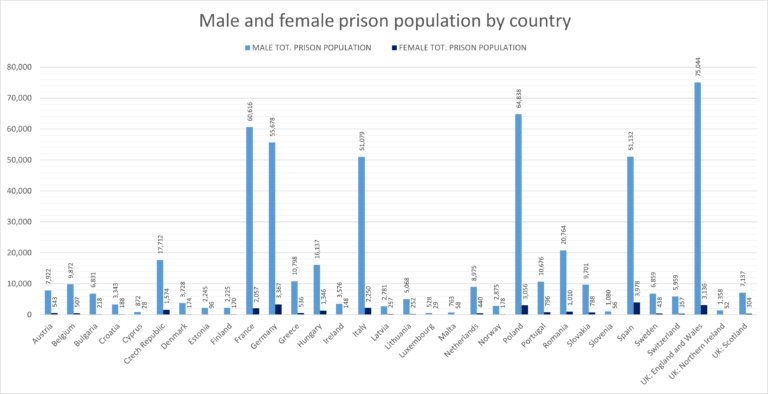Not all prisoners are actually in prison. A prison can be your mind, your body or your home.
I have recently chatted to someone who rarely goes out of the house. I regularly chat to people with varying forms of mental illness who are trapped in their memories & beliefs. I know people who have some form of chronic physical illness, which means they are no longer able to do basic things. All of them are prisoners in different ways. Some are not aware that they are imprisoned. Fortunately not all of them feel that they are victims. I know people who have adapted to their limits & live lives that are relatively contented. Certainly ageing means that you need to adapt to a body & mind that is showing signs of normal wear & tear.
All of that is very different to the lives of people, mainly men, who are incarcerated in an actual prison in the UK. 96% of prisoners are men. England & Wales lock up more people than any other country in Europe. Goodness knows what the stats are in 2024, but I guarantee they are worse.

In October 2023 two thirds of UK prisons were overcrowded. That means prisoners sharing cells designed for one, often with a toilet in the middle shielded by a curtain. Reports from the IMB & HM Inspectors of Prisons regularly find that prisons are dangerously overcrowded & conditions are inhumane.
Judges have been told to delay sentencing. Since October 2023 the End of Custody Supervision Licence Scheme has been used to allow "low-level offenders" to be freed from prisons in England and Wales up to 18 days early under strict supervision. This was extended to 60 days in March 2024 and it is due to be extended to 70 days. What is the point of Courts following sentencing guidelines when the Government reduces sentences properly administered by judges?
I really question how effective our prisons are. Prisons in England ran emergency “red regimes” 22 times last year, after falling below minimum staffing levels. Only a basic regime can be achieved. Prisoners are denied access to work, the library, rehabilitation, exercise, showers or even meals leading to a “culture of hopelessness.” How humane is this, to lock prisoners in cells for close to 24 hours a day?
I am mindful that, hopefully, people are rightfully imprisoned for comitting crimes & there are victims of those crimes. Violence against the person (VATP) offences
were the highest proportion of prisoners in June
2023 (31%). Sexual offences was the second highest category for adults
(20%).For juveniles it was drug offences (17%). The top 8 crimes are;-
- Homicide. ...
- Knife or sharp instrument offences. ...
- Offences involving firearms. ...
- Violence. ...
- Domestic abuse and sexual offences. ...
- Theft offences. ...
- Fraud. Estimates for the year ending March 2023 showed 3.5 million fraud offences. ...
- Computer misuse.
These are serious offences, with many victims.
Can we actually run a humane & effective prison service when many prisons are old & not fit for purpose? 90 prisons were built or added to between 1842 & 1877. 20 prisons were opened in the 60's, 9 in the70's, 13 in the 80s, 16 in the 90s, 7 in the first decade of the new century and four since ...
What do we want to achieve by imprisoning people? Do we think that people who have committed a crime don't deserve reasonable living conditions, food & access to healthcare, exercise & education? Do we want to try to rehabilitate if possible & give people the skills to live as reasonably useful members of society?
Other countries manage to achieve results far beyond what the UK achieves. The Scandinavian countries are widely recognised as having humane & effective prison systems. How can we release prisoners back into the community if we have dehumanised them in a system that is not fit for purpose?
No comments:
Post a Comment